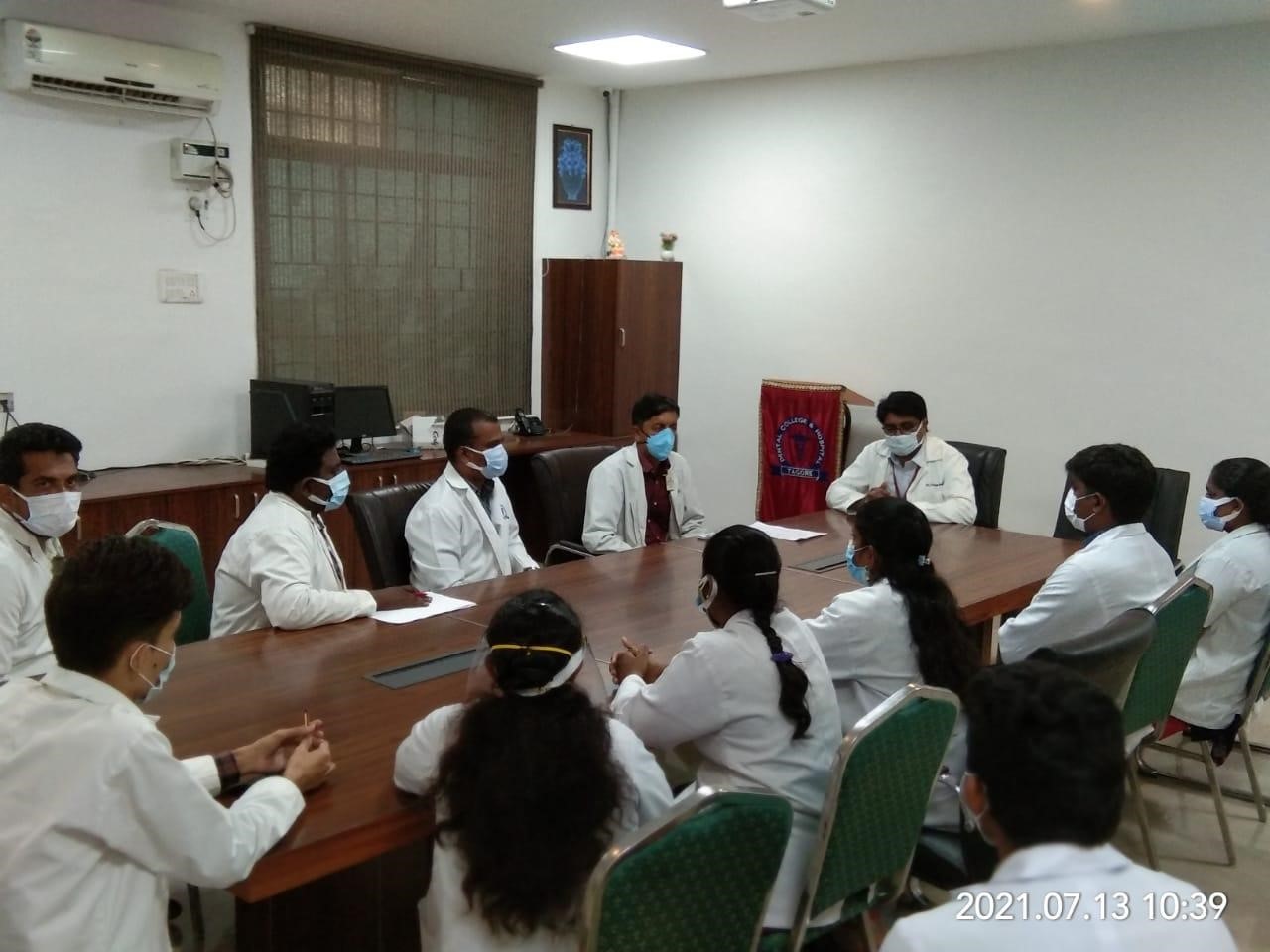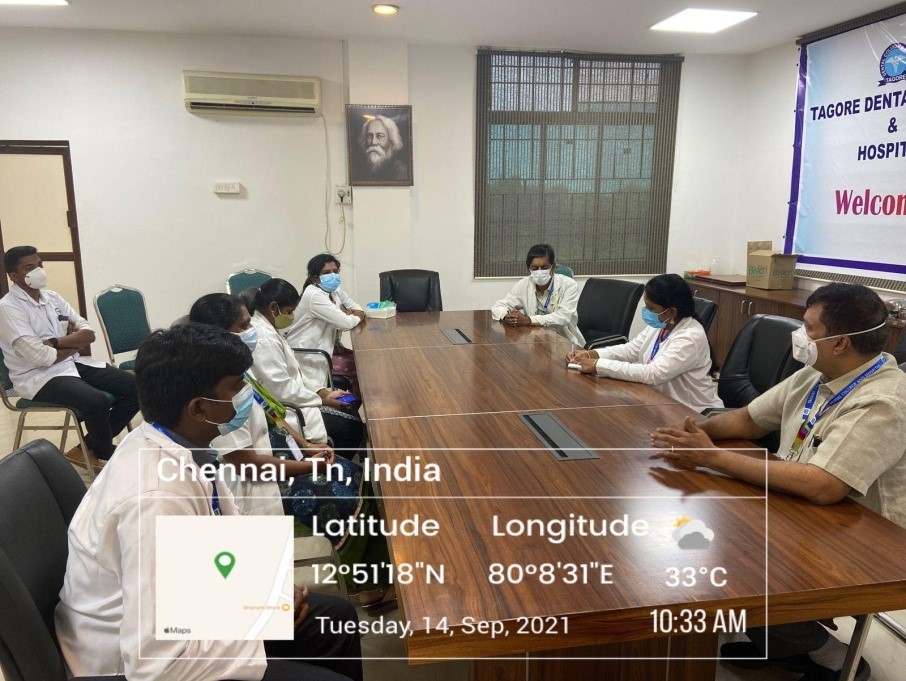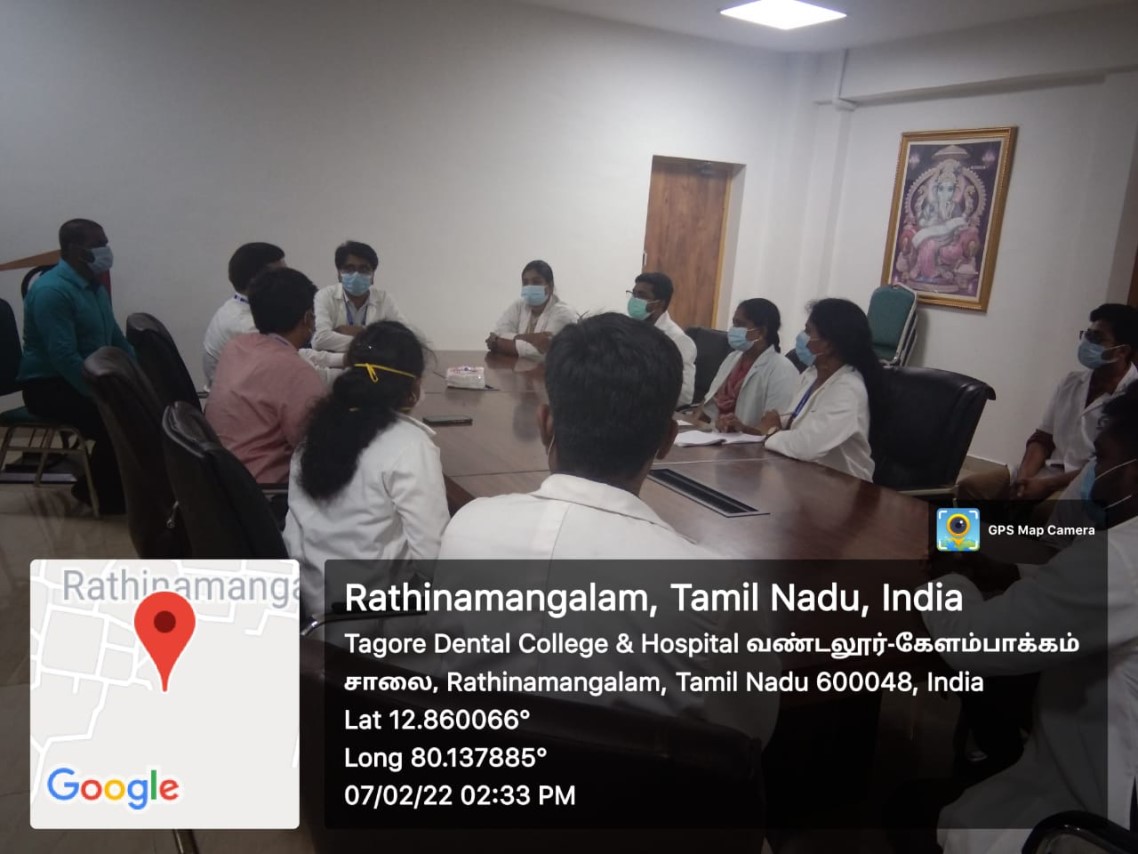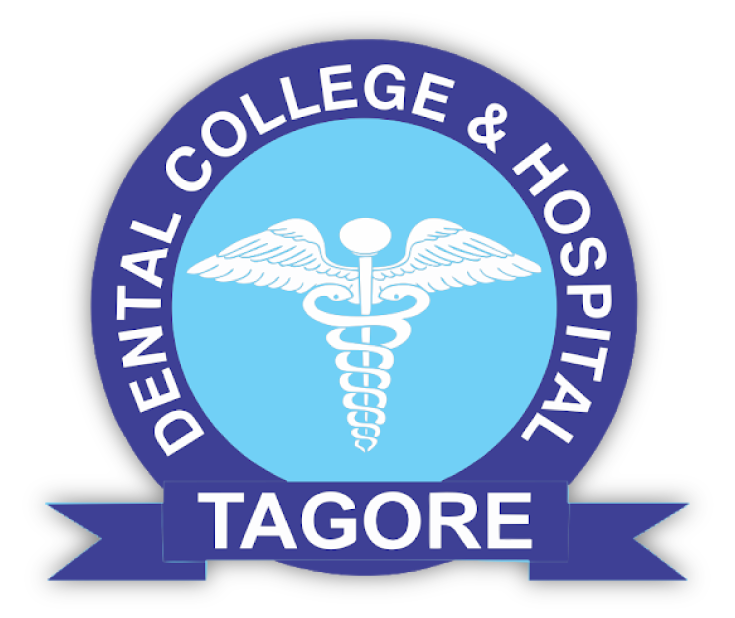ANTI RAGGING COMMITTEE
- Anti Ragging Week 12TH Aug 2023 TO 18TH Aug 2023 Click here
- Anti Ragging Week 2024 Click here
OBJECTIVES
To prohibit any conduct by any student or students whether by words spoken or written or by an act which has the effect of teasing, treating or handling with rudeness a fresher or any other student, or indulging in rowdy or undisciplined activities by any student or students which causes or is likely to cause annoyance, hardship or psychological harm or to raise fear or apprehension thereof in any fresher or any other student or asking any student to do any act which such student will not in the ordinary course do and which has the effect of causing or generating a sense of shame, or torment or embarrassment so as to adversely affect the physique or psyche of such fresher or any other student, with or without an intent to derive a sadistic pleasure or showing off power, authority or superiority by a student over any fresher or any other student; and thereby, to eliminate ragging in all its forms from college, prohibiting it under these Regulations, preventing its occurrence and punishing those who indulge in ragging as provided for in these Regulations and the appropriate law in force.
Purpose
In deference of the preamble of Anti‐Ragging Policy, the college encourages socialization of fresher students in the academic environment of the college. At the same time, it discourages and prevents any negative act, e.g., devious or diabolic or brutal or any other untoward action or behavior on the part of senior students which goes against the basic philosophy of socio‐ academic integration. The ‘anti‐ragging policy’ adopted by the college therefore is aimed at:
- Creating, developing and nourishing conducive academic environment within the student community by their social integration.
- Generating and maintaining a high level of confidence within new entrants and their parents/guardians that new entrants to the college are not going to be harassed and intimidated and will get all support and learning congenial environment at the campus.
- Keeping in place an integrated system to discourage and prevent any negative acts like alcoholism, drugs abuse and ragging in what so ever be the manner by the seniors, which disrupts socio‐academic integration of new entrants.
- Prescribing deterrent measures for any violation of the “Anti‐Ragging Policy” by way of disciplinary action.
Ragging constitutes one or more of any of the following acts:
- Any conduct by any student or students whether by words spoken or written or by an act which has the effect of teasing, treating or handling with rudeness a fresher or any other student;
- Indulging in rowdy or undisciplined activities by any student or students which causes or is likely to cause annoyance, hardship, physical or psychological harm or to raise fear or apprehension thereof in any fresher or any other student;
- Asking any student to do any act which such student will not in the ordinary course do and which has the effect of causing or generating a sense of shame, or torment or embarrassment so as to adversely affect the physique or psyche of such fresher or any other student;
- Any act by a senior student that prevents, disrupts or disturbs the regular academic activity of any other student or a fresher;
- Exploiting the services of a fresher or any other student for completing the academic tasks assigned to an individual or a group of students
- Any act of financial extortion or forceful expenditure burden put on a fresher or any other student by students;
- Any act of physical abuse including all variants of it: sexual abuse, homosexual assaults, stripping, forcing obscene and lewd acts, gestures, causing bodily harm or any other danger to health or person;
- Any act or abuse by spoken words, emails, post, public insults which would also include deriving perverted pleasure, vicarious or sadistic thrill from actively or passively participating in the discomfiture to fresher or any other student ;
- Any act that affects the mental health and self-confidence of a fresher or any other student with or without an intent to derive a sadistic pleasure or showing off power, authority or superiority by a student over any fresher or any other student.
- Ragging has several aspects viz. psychological, social, political, economic, culture and academic dimensions. The Psychological aspects of ragging are seen to cause permanent damage to the victim’s personality. Such treatment of young and impressionable minds could result in traumatizing them and damaging their personalities beyond repair in the formative years of their lives.
- Any act or abuse by spoken words, texts, emails, public insult or alike should be considered within the physiological aspects of ragging.
- This aspect would also include deriving perverted pleasure, vicarious or sadistic thrill from activity or passively participating in the discomfort of others.
- Any act that affects the mental health and self confidence of students can be described in terms of the psychological aspects of ragging.
Anti Ragging measures
The departments, and premises, whether academic, residential, playgrounds, or canteen, whether located within the campus or outside, and in all means of transportation of students, whether public or private, condone any incident of ragging in any form; and shall take all necessary and required measures, including but not limited to the provisions of these Regulations, to achieve the objective of eliminating ragging, within the institution or outside.
Action would be taken in accordance with the Regulations advised by the UGC, against those found guilty of ragging and/or abetting ragging, actively or passively, or being part of a conspiracy to promote ragging.
- Every fresh student admitted to the institution would be given a printed leaflet detailing to whom he/she has to turn to for help and guidance for various purposes including addresses and telephone numbers, so as to enable the student to contact the concerned person at any time, if and when required, of the Anti-Ragging Helpline referred to in these Regulations, Wardens, Head of the institution, all members of the anti-ragging squads and committees, relevant district and police authorities.
- Address by the Chairperson/Principal of the college, during their address to parents/guardians, at new batch induction, batch inaugurals and other such occasions, would invariably assure the students and parents about full protection and support against any attempt of ragging by seniors while briefly explaining the ‘Anti Ragging Policy’ of the college. The efforts during such meets would be directed towards achieving socio‐academic integration of new entrants.
- The institution would explain to the fresher’s, the arrangements made for their induction and orientation which promote efficient and effective means of integrating them fully as students with those already admitted o the institution in earlier years.
- The Principal would advice the fresher’s about their rights as bona fide students of the institution and clearly instructing them that they should desist from doing anything, with or against their will, even if ordered to by the seniors students, and that any attempt of ragging shall be promptly reported to the Anti-ragging Squad or to the Warden or to the Head of the institution, as the case may be.
- A leaflet containing a calendar of events and activities laid down by the institution to facilitate and complement familiarization of fresher’s with the academic environment of the institution.
- The institution will set up appropriate committees, including the course-in charge, student advisor, Wardens and some senior students as its members, to actively monitor, promote and regulate healthy interaction between the fresher’s, junior students and senior students.
- Fresher’s or any other student(s), whether being victims, or witnesses, in any incident of ragging, would be encouraged to report such occurrence, and the identity of such informants shall be protected and shall not be subject to any adverse consequence.
- Each batch of fresher’s, on arrival at the institution, shall be divided into small groups and each such group shall be assigned to a member of the faculty, who shall interact individually with each member of the group for ascertaining the problems or difficulties, if any, faced by the fresher in the institution and shall extend necessary help to the fresher in overcoming the same.
- It shall be the responsibility of the member of the faculty assigned to the group of fresher’s, to coordinate with the Wardens of the hostels and to make surprise visits to the rooms in such hostels, where a member or members of the group are lodged; and such member of faculty shall maintain a diary of his/her interaction with the fresher’s under his/her charge.
- A round the clock vigil against ragging in the hostel premises, would be done in order to prevent ragging in the hostels after the classes are over.
- It shall be the responsibility of the parents/guardians of fresher’s to promptly bring any instance of ragging to the notice of the Head of the Institution.
- Every student studying in the institution and his/her parents/guardians shall provide the specific affidavits for the ant ragging, at the time of admission or registration, as the case may be, during each academic year.
- Every student at the time of his/her registration shall inform the institution about his/her place of residence while pursuing the course of study, and in case the student has not decided his/her place of residence or intends to change the same, the details of his place of residence shall be provided immediately on deciding the same; and specifically in regard to a private commercially managed lodge or hostel where he/she has taken up residence.
- Social, Cultural and Sports Activities. To ensure a better socio‐cultural mix, social integration is very important between all batches. The college has set up social, cultural, and sports committees, under the charge of a faculty member. Membership of these committees will be on a mixed group pattern, with a cross‐ section of senior and junior students. While on one hand this would help develop the extra‐ curricular activities in the college, on the other hand it would help improve the interaction between students of different batches.
- The Head of the institution shall, at the end of each academic year, send a letter to the parents/guardians of the students who are completing their first year in the institution, informing them about these Regulations and any law for the time being in force prohibiting ragging and the punishments thereof as well as punishments prescribed under the penal laws, and appealing to them to impress upon their wards to desist from indulging in ragging on their return to the institution at the beginning of the next academic session.
OTHER MEASURES TAKEN FOR PREVENTION OF RAGGING
College has complaint cum suggestion boxes in the entrance of the college, First Year Class room, near Principals Office and also in Hostel which will be opened by the Head of the Institution on a daily basis for the first three months after admission and thereafter at regular intervals for any complaint/suggestion received.
- Boards are displayed in prominent positions about what constitutes ragging, ill effects of ragging and punishments meted out for ragging. Contact persons and their phone numbers are prominently displayed.
- CCTV are placed in classrooms, corridors, labs and common rooms to deter students from ragging.
- Each hostel will have a full-time Warden, reflecting both the command and control aspects of maintaining discipline and preventing incidents of ragging within the hostel, as well as the softer skills of counseling and communicating with the youth outside the class-room situation; and who shall reside within the hostel, or at the very least, in the close vicinity thereof.
- The Warden shall be accessible at all hours and be available on telephone and other modes of communication.
- The institution will review and suitably enhance the powers of Wardens; and the security personnel posted in hostels shall be under the direct control of the Warden and their performance shall be assessed by them.
- The professional counselors shall, at the time of admission, counsel fresher’s and/or any other student(s) desiring counseling, in order to prepare them for the life ahead, particularly in regard to the life in hostels and to the extent possible, also involve parents and teachers in the counseling sessions.
- The institution shall undertake measures for extensive publicity against ragging by means of audio-visual aids, counseling sessions, workshops, painting and design competitions among students and such other measures, as it may deem fit.
- In order to enable a student or any person to communicate with the Anti Ragging Helpline, unrestricted access to mobile phones and public phones in hostels and campuses are provided, other than in class-rooms, seminar halls, library, and in such other places that the institution may deem it necessary to restrict the use of phones.
- The faculty of the institution and its non-teaching staff, which includes but is not limited to the administrative staff, contract employees, security guards and employees of service providers providing services within the institution, shall be sensitized towards the ills of ragging, its prevention and the consequences thereof.
- The institution would give necessary instructions to the employees of the canteens and messing, whether that of the institution or that of a service provider providing this service, or their employers, as the case may be, to keep a strict vigil in the area of their work and to report the incidents of ragging to the Head of the institution or members of the Anti-Ragging Squad or members of the Anti-Ragging Committee or the Wardens, as may be required.
- Teachers are advised on inputs relating to anti ragging and the appreciation of the relevant human rights, as well as inputs on topics regarding sensitization against corporal punishments and checking of bullying amongst students, so that every teacher is equipped to handle at least the rudiments of the counseling approach.
PUNISHMENT AND PENALTIES FOR RAGGING
The institution shall punish a student found guilty of ragging after following the procedure and in the manner prescribed herein under:
a) The Anti-Ragging Committee of the institution shall take an appropriate decision, in regard to punishment or otherwise, depending on the facts of each incident of ragging and nature and gravity of the incident of ragging established in the recommendations of the Anti-Ragging Squad
b) The Anti-Ragging Committee may, depending on the nature and gravity of the guilt established by the Anti-Ragging Squad, award, to those found guilty, one or more of the following punishments, namely;
- Suspension from attending classes and academic privileges.
- Withholding/ withdrawing scholarship/ fellowship and other benefits.
- Debarring from appearing in any test/ examination or other evaluation process.
- Withholding results.
- Debarring from representing the institution in any regional, national or international meet, tournament, youth festival, etc.
- Suspension/ expulsion from the hostel. vii. Cancellation of admission.
- Rustication from the institution for period ranging from one to four semesters.
- Expulsion from the institution and consequent debarring from admission to any other institution for a specified period.
- Provided that where the persons committing or abetting the act of ragging are not identified, the institution shall resort to collective punishment.
COMPLAINTS ABOUT RAGGING
- If any individual believes that he or she has been subjected to ‘ragging’ or has knowledge of any such incident, shall file a complaint with the Principal or any staff of the college.
- This may be done in writing, mail or orally. However, written complaint is preferable
- Complaint may be lodged by the victim or any witness or bystander because in most cases the victims are too scared to complain.
- If the informant would like to remain anonymous the secrecy would be maintained.
- Victim’s secrecy if needed will also be maintained.
ENQUIRY ON COMPLAINTS
- All complaints will be forwarded to the committee for enquiry.
- Committee will investigate all reported cases of ragging, in such a way, so as to maintain confidentiality to the extent practicable under the circumstances.
- The investigations will start within three days of reporting the incident and reports finalized by the ‘Enquiry Committee’ pinpointing the involvement of the accused along with recommendations relating to the punishment will be submitted to the Principal within a period of two weeks.
- Since delay in taking action can frustrate the complainant so the authorities are prima‐facie satisfied about the errant act of any student, they can in appropriate cases pending final decision suspend the student from the college and the hostel if any after giving reasonable opportunity of being heard.
- The committee will first hear the complainants and record his or her allegations. The complainant can also produce corroborative material for proof of evidence. If the complainant does not want to depose due to embarrassment a male or female staff (as the case may be)may be asked to record their statement
- There after the person against whom the complaint was raised is given an opportunity to give an explanation and recorded.
- The enquiry is then conducted and concluded
- The report submitted by the enquiry committee is the basis for recommendations of punishment by the higher authorities.
ANTI RAGGING COMMITTEE
|
SL.NO |
NAME OF THE MEMBER |
DESIGNATION |
|
1 |
Dr.C.J. Venkatakrishanan |
Chairman |
|
2 |
Dr. S. Balagopal |
Member Secretary |
|
3 |
Dr.G.S. Asokan |
Member |
|
4 |
Dr.Anand |
Member |
|
5 |
Mr.Selvakumar |
Non teaching- Member |
|
6 |
Mr. Veylayutham |
Public Representative Member |
|
7 |
Mr. Mano Bharathi |
Media Representative Member |
|
8 |
Mr. Selvamani |
NGO Member |
|
9 |
Mr. Haris |
Day scholar |
|
10 |
Ms. Shanmathi |
Day scholar |
|
11 |
Mr. Mohandev |
Boys Hostel Student |
|
12 |
Ms. Batty Sharan |
Girls Hostel Student |
|
13 |
Mr. Manikandan |
Management Representative |
ANTI RAGGING SQUAD
|
SL.NO |
NAME OF THE MEMBER |
DESIGNATION |
|
COLLEGE |
||
|
1 |
Dr.Lokesh |
Member |
|
2 |
Dr. B. Anandh |
Member |
|
3 |
Dr.Soundarya |
Member |
|
4 |
Dr. Pravina Fernando |
Member |
|
HOSTEL |
||
|
5 |
Dr.Anisha |
Member |
|
6 |
Dr. David |
Member |
|
7 |
Dr. Rathinavel Pandian |
Member |
|
8 |
Dr. Virudambal |
Member |
|
PUBLIC PLACE |
||
|
9 |
Dr. Praveen Raj |
Member |
|
10 |
Dr.Juala Catherine |
Member |
|
11 |
Dr. Anitha |
Member |
- 2020-21 ANTI RAGGING COMMITTEE MINUTES Click here
- Anti Ragging minutes 2021-22 Click here
- MENACE OF RAGGING 13MAY2022 Click here
- MENACE OF RAGGING10OCT2021 Click here
PHOTOS OF ANTIRAGGING COMMITTEE MEEETINGS
MEETINGS OF 2021
13.7.2021

14.9.2021

MEETINGS OF 2022
7.2.22




